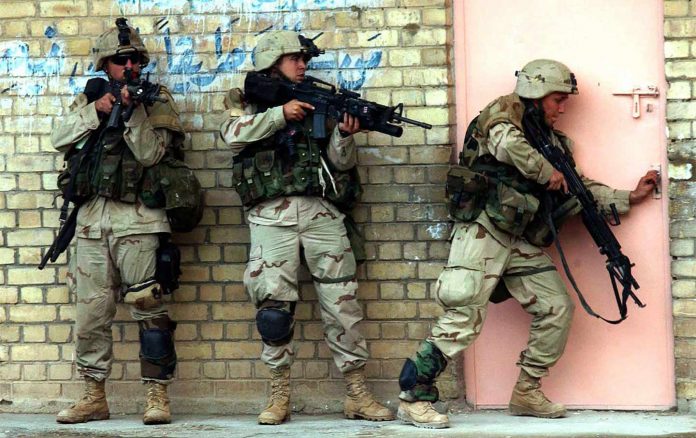Congress Grudgingly Approves Billions for the Iraq War Without Troop Withdrawal Timeline
by David Espo
WASHINGTON–Bowing to President Bush, the Democratic-controlled Congress grudgingly approved fresh billions for the Iraq war Thursday night, minus the troop withdrawal timeline that drew his earlier veto.
“The Iraqi government needs to show real progress in return for America’s continued support and sacrifice,” said the commander-in-chief, and he warned that August could prove to be a bloody month for U.S. troops in Baghdad’s murderous neighborhoods.
The Senate vote to send the legislation to the president was 80-14. Less than two hours earlier, the House had cleared the measure, 280-142, with Republicans supplying the bulk of the support…
After five months in power on Capitol Hill, Democrats in both houses coupled their concession to the president with pledges to challenge his policies anew. “This debate will go on,” vowed House Speaker Nancy Pelosi, and if anything, Senate Majority Leader Harry Reid of Nevada was more emphatic.
“Senate Democrats will not stop our efforts to change the course of this war until either enough Republicans join with us to reject President Bush’s failed policy or we get a new president,” he said.
From the White House to the Capitol, the day’s events closed out one chapter in an epic struggle pitting Congress against the commander in chief over a war that has claimed the lives of more than 3,400 U.S. troops.
House Republican leader John Boehner of Ohio choked back tears as he stirred memories of the terror attacks of Sept. 11, 2001. “After 3,000 of our fellow citizens died at the hands of these terrorists, when are we going to take them on? When are we going to defeat them,” he asked.

The legislation includes nearly $95 billion to pay for the wars in Iraq and Afghanistan through Sept. 30. In addition to jettisoning their plan for a troop withdrawal timeline, Democrats abandoned attempts to require the Pentagon to adhere to troop training, readiness, and rest requirements unless Bush waived them.
The bill establishes a series of goals for the Iraqi government to meet as it strives to build a democratic country able to defend its own borders. Continued U.S. reconstruction aid would be conditioned on progress toward the so-called benchmarks, although Bush retains the authority to order that the funds be spent regardless of how the Baghdad government performs.
In a highly unusual maneuver, House Democratic leaders crafted a procedure that allowed their rank and file to oppose money for the war, then step aside so Republicans could advance it. There were 194 Republicans in favor, as well as 86 Democrats, three members of the leadership among them. Pelosi and 139 other Democrats voted against the measure, as did two Republicans.
In exchange for providing the war money on Bush’s terms, Democrats won White House approval for about $17 billion in spending above what the administration originally sought. Roughly $8 billion of that was for domestic programs from hurricane relief to farm aid to low-income children’s health coverage.
In exchange for providing the war money on Bush’s terms, Democrats won White House approval for about $17 billion in spending above what the administration originally sought. Roughly $8 billion of that was for domestic programs from hurricane relief to farm aid to low-income children’s health coverage.
Democrats also won a top priority the first minimum wage increase in more than a decade. The current federal wage floor of $5.15 an hour will go to $7.25 in three separate installments of 70 cents.
Reflecting unhappiness among conservatives in his own party, Bush said he would have preferred less domestic spending than the bill contained. “But, still, by voting for this bill members of both parties can show our troops and the Iraqis and the enemy that our country will support our servicemen and women in harm’s way,” he said at a Rose Garden news conference.
One of the most vocal war critics in Congress readily agreed. “This is not a game. They run out of money next week,” said Rep. John Murtha of Pennsylvania, whose speech opposing Bush’s Iraq policy more than a year ago was a turning point in the debate.
Bush ordered the deployment of an additional five brigades to Iraq in January to try and quell sectarian violence, and he said summer would be critical to the fate of the new strategy.
Gen. David Petraeus, the top commander in Iraq, has pledged to report to the administration and Congress in September on the progress made in the war, and Bush conceded that al-Qaida terrorists and illegal militias will make sure there is heavy fighting in the interim to try and sap the will of the United States.
“And so, yes, it could be a bloody it could be a very difficult August,” he said.
He said he wants to see American troops “in a different configuration at some point in time in Iraq.” He said that meant moving from mostly combat to training, border security and special forces anti-terror operations.
“However,” Bush said, “it’s going to require taking control” of Baghdad.
With a new poll showing that 80 percent of self-described independents oppose the war, it was unclear how long Bush could fend off his Democratic critics in Congress or even count on Republicans to hold firm.
“It seems to me it’s time for them (Iraqi troops) to show what is their ability and professionalism to step up,” said Sen. John Warner, R-Va. He said if conditions do not improve by mid-July, the president should reconsider his strategy.
ATTENTION READERS
We See The World From All Sides and Want YOU To Be Fully InformedIn fact, intentional disinformation is a disgraceful scourge in media today. So to assuage any possible errant incorrect information posted herein, we strongly encourage you to seek corroboration from other non-VT sources before forming an educated opinion.
About VT - Policies & Disclosures - Comment Policy




